Top Rankings
Salt Lake School District ranks among the top 20% of public school district in Utah for:
Category
Attribute
Diversity
Most diverse schools (Top 1%)
Community Size
Largest student body (number of students) (Top 1%)
For the 2025 school year, there are 8 public high schools serving 6,964 students in Salt Lake School District. This district's average high testing ranking is 7/10, which is in the top 50% of public high schools in Utah.
Public High Schools in Salt Lake School District have an average math proficiency score of 26% (versus the Utah public high school average of 34%), and reading proficiency score of 52% (versus the 44% statewide average).
Public High School in Salt Lake School District have a Graduation Rate of 74%, which is less than the Utah average of 88%.
The school with highest graduation rate is Innovations High School, with 85-89% graduation rate. Read more about public school graduation rate statistics in Utah or national school graduation rate statistics.
Minority enrollment is 61% of the student body (majority Hispanic), which is more than the Utah public high school average of 29% (majority Hispanic).
Overview
This School District
This State (UT)
# Schools
42 Schools
357 Schools
# Students
19,176 Students
304,700 Students
# Teachers
1,040 Teachers
13,717 Teachers
Student : Teacher Ratio
19:1
19:1
District Rank
Salt Lake School District, which is ranked within the bottom 50% of all 153 school districts in Utah (based off of combined math and reading proficiency testing data) for the 2020-2021 school year.
The school district's graduation rate of 74% has increased from 71% over five school years.
Overall District Rank
#92 out of 154 school districts
(Bottom 50%)
(Bottom 50%)
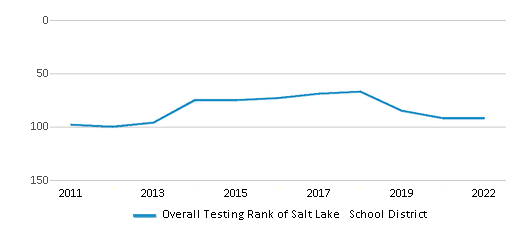
Math Test Scores (% Proficient)
(20-21)30%
39%
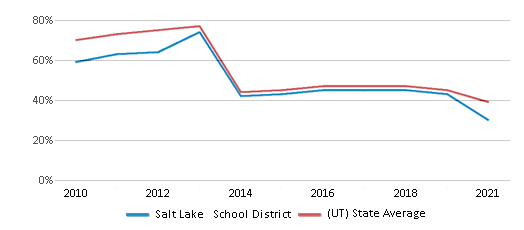
Reading/Language Arts Test Scores (% Proficient)
(20-21)37%
43%
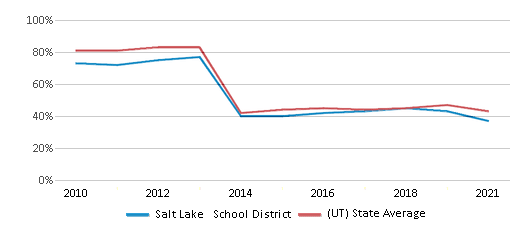
Science Test Scores (% Proficient)
(20-21)37%
45%
Graduation Rate
74%
88%
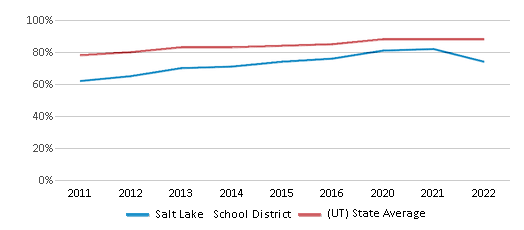
Students by Ethnicity:
Diversity Score
0.68
0.45
# American Indian Students
205 Students
2,617 Students
% American Indian Students
1%
1%
# Asian Students
878 Students
5,001 Students
% Asian Students
5%
2%
# Hispanic Students
7,666 Students
59,783 Students
% Hispanic Students
40%
20%
# Black Students
970 Students
4,038 Students
% Black Students
5%
1%
# White Students
7,633 Students
217,573 Students
% White Students
40%
71%
# Hawaiian Students
948 Students
4,429 Students
% Hawaiian Students
5%
1%
# Two or more races Students
872 Students
11,163 Students
% of Two or more races Students
4%
4%
Students by Grade:
# Students in PK Grade:
516
458
# Students in K Grade:
1,203
3,590
# Students in 1st Grade:
1,344
3,628
# Students in 2nd Grade:
1,382
3,655
# Students in 3rd Grade:
1,299
3,723
# Students in 4th Grade:
1,381
3,717
# Students in 5th Grade:
1,304
3,667
# Students in 6th Grade:
1,228
4,950
# Students in 7th Grade:
1,380
27,723
# Students in 8th Grade:
1,379
34,647
# Students in 9th Grade:
1,619
53,806
# Students in 10th Grade:
1,725
55,206
# Students in 11th Grade:
1,689
54,320
# Students in 12th Grade:
1,727
51,610
# Ungraded Students:
-
-
District Revenue and Spending
The revenue/student of $15,540 is higher than the state median of $10,732. The school district revenue/student has grown by 8% over four school years.
The school district's spending/student of $14,135 is higher than the state median of $10,829. The school district spending/student has grown by 8% over four school years.
Total Revenue
$298 MM
$7,309 MM
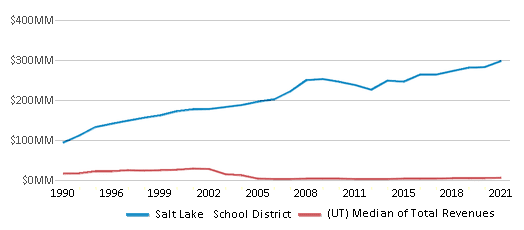
Spending
$271 MM
$7,375 MM
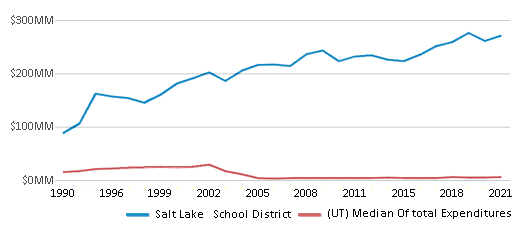
Revenue / Student
$15,540
$10,732
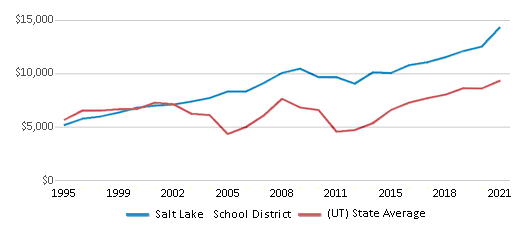
Spending / Student
$14,135
$10,829
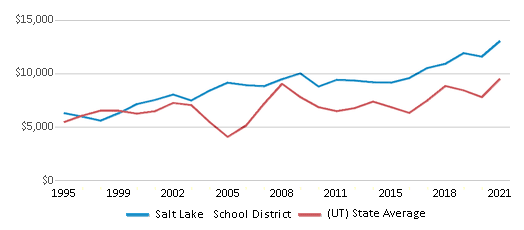
Best Salt Lake School District Public High Schools (2025)
School
(Math and Reading Proficiency)
(Math and Reading Proficiency)
Location
Grades
Students
Rank: #11.
Horizonte Instruction & Training Center
Alternative School
(Math: <50% | Reading: <50%)
Rank:
Rank:
8/
Top 30%10
1234 S Main
Salt Lake City, UT 84101
(801) 578-8574
Salt Lake City, UT 84101
(801) 578-8574
Grades: 7-12
| 303 students
Rank: #22.
West High School
(Math: 33% | Reading: 60%)
Rank:
Rank:
7/
Top 50%10
241 N 300 W
Salt Lake City, UT 84103
(801) 578-8500
Salt Lake City, UT 84103
(801) 578-8500
Grades: 7-12
| 2,505 students
Rank: #33.
Highland High School
(Math: 21% | Reading: 54%)
Rank:
Rank:
5/
Bottom 50%10
2166 S 1700 E
Salt Lake City, UT 84106
(801) 484-4343
Salt Lake City, UT 84106
(801) 484-4343
Grades: 9-12
| 2,009 students
Rank: #44.
East High School
(Math: 17% | Reading: 36%)
Rank:
Rank:
2/
Bottom 50%10
840 S 1300 E
Salt Lake City, UT 84102
(801) 583-1661
Salt Lake City, UT 84102
(801) 583-1661
Grades: 9-12
| 1,863 students
Rank: #55.
Innovations High School
(Math: ≤10% | Reading: 30-39%)
Rank:
Rank:
2/
Bottom 50%10
1700 South State Street
Salt Lake City, UT 84115
(801) 481-4946
Salt Lake City, UT 84115
(801) 481-4946
Grades: 9-12
| 284 students
Rank: n/an/a
Columbus Community Center
Special Education School
3495 S West Temple
Salt Lake City, UT 84115
(801) 262-1552
Salt Lake City, UT 84115
(801) 262-1552
Grades: K-12
| n/a students
Rank: n/an/a
Salt Lake Technology Center
Vocational School
1560 S 200 E
Salt Lake City, UT 84115
(801) 481-4946
Salt Lake City, UT 84115
(801) 481-4946
Grades: 9-12
| n/a students
Rank: n/an/a
Sky View Academy
Special Education School
1480 North 8000 West
Salt Lake City, UT 84101
(801) 578-8574
Salt Lake City, UT 84101
(801) 578-8574
Grades: 12
| n/a students
Recent Articles

Year-Round Or Traditional Schedule?
Which is more appropriate for your child? A year-round attendance schedule or traditional schedule? We look at the pros and cons.

Why You Should Encourage Your Child to Join a Sports Team
Participating in team sports has a great many benefits for children, there is no doubt. In this article you will learn what those benefits are.

White Students are Now the Minority in U.S. Public Schools
Increasing birth rates among immigrant families from Asia and Central and South America, combined with lower birth rates among white families, means that for the first time in history, public school students in the United States are majority-minority. This shift in demographics poses difficulties for schools as they work to accommodate children of varying language abilities and socio-economic backgrounds.





